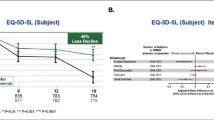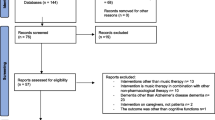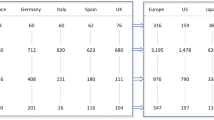Abstract
Purpose
To examine caregivers’ health-related quality of life (HRQoL) and well-being during the first 3 years after their family member’s Alzheimer’s disease (AD) diagnosis and assessed the relationship between caregivers’ HRQoL, well-being, and the severity of AD. Further, to compare of caregivers’ HRQoL to general population.
Methods
Longitudinal design (36 months) after AD diagnosis of 236 caregiver–patient dyads. Linear regression was used to assess age- and gender-adjusted association between repeated measurements of caregivers’ HRQoL and the severity of AD. For comparison with general population, the National Health 2011 Health Examination Survey data was utilized.
Results
Caregivers had significantly lower HRQoL than age- and gender-standardized counterparts. Severity of AD was significantly (p < 0.05) associated with the mobility and depression dimensions of caregiver’s HRQoL but not with the total HRQoL index score.
Conclusions
Caregivers’ HRQoL seems to deteriorate earlier than previously noted. The severity of AD has not that great impact on caregiver’s HRQoL as assumed.




Similar content being viewed by others
Abbreviations
- AD:
-
Alzheimer’s disease
- ADCS-ADL:
-
Alzheimer’s Disease Cooperative Study Activities of Daily Living scale
- AIC:
-
Akaike information criteria
- CDR:
-
Clinical Dementia Rating
- CDR-SOB:
-
Clinical Dementia Rating, Sum of Boxes
- CT:
-
Computed tomography
- DSM-IV:
-
Diagnostic and Statistical Manual of Mental Disorders, Fourth Edition
- GEE:
-
Generalized estimating equation
- HRQoL:
-
Health-related quality of life
- MCI:
-
Mild cognitive impairment
- MMSE:
-
Mini-mental state examination
- MRI:
-
Magnetic resonance imaging
- NINCDS-ADRDA:
-
National Institute of Neurological and Communicative Disorders and Stroke and Alzheimer’s Disease and Related Disorders Association
- NPI:
-
Neuropsychiatric inventory
- QIC:
-
Quasi-AIC
- VAS:
-
Visual analog scale
References
Argimon, J. M., Limon, E., Vila, J., & Cabezas, C. (2005). Health-related quality-of-life of care-givers as a predictor of nursing-home placement of patients with dementia. Alzheimer Disease and Associated Disorders, 19(1), 41–44.
Schölzel-Dorenbos, C. J., Draskovic, I., Vernooij-Dassen, M. J., & Olde Rikkert, M. G. (2009). Quality of life and burden of spouses of Alzheimer disease patients. Alzheimer Disease and Associated Disorders, 23(2), 171–177.
Takai, M., Takahashi, M., Iwamitsu, Y., Ando, N., Okazaki, S., Nakajima, K., et al. (2009). The experience of burnout among home caregivers of patients with dementia: Relations to depression and quality of life. Archives of Gerontology and Geriatrics, 49(1), e1–e5.
Thomas, P., Lalloué, F., Preux, P. M., Hazif-Thomas, C., Pariel, S., Inscale, R., et al. (2006). Dementia patients caregivers quality of life: The PIXEL study. International Journal of Geriatric Psychiatry, 21(1), 50–56.
Cupidi, C., Realmuto, S., Lo Coco, G., Cinturino, A., Talamanca, S., Arnao, V., et al. (2012). Sleep quality in caregivers of patients with Alzheimer’s disease and Parkinson’s disease and its relationship to quality of life. International Psychogeriatrics, 24(11), 1827–1835.
Luppa, M., Luck, T., Brähler, E., König, H. H., & Riedel-Heller, S. G. (2008). Prediction of institutionalisation in dementia. A systematic review. Dementia and Geriatric Cognitive Disorders, 26(1), 65–78.
World Health Organization. (1995). The World Health Organization Quality of Life Assessment (HWOQOL): Position paper from the World Health Organization. Social Science and Medicine, 41(10), 1403–1409.
Markowitz, J. S., Gutterman, E. M., Sadik, K., & Papadopoulos, G. (2003). Health-related quality of life for caregivers of patients with Alzheimer disease. Alzheimer Disease and Associated Disorders, 17(4), 209–214.
Serrano-Aguilar, P. G., Lopez-Bastida, J., & Yanes-Lopez, V. (2006). Impact on health-related quality of life and perceived burden of informal caregivers of individuals with Alzheimer’s disease. Neuroepidemiology, 27(3), 136–142.
Ekwall, A. K., Sivberg, B., & Hallberg, I. R. (2007). Older caregivers’ coping strategies and sense of coherence in relation to quality of life. Journal of Advanced Nursing, 57(6), 584–596.
Takai, M., Takahashi, M., Iwamitsu, Y., Oishi, S., & Miyaoka, H. (2011). Subjective experiences of family caregivers of patients with dementia as predictive factors of quality of life. Psychogeriatrics, 11(2), 98–104.
Duggleby, W. D., Swindle, J., Peacock, S., & Ghosh, S. (2011). A mixed methods study of hope, transitions, and quality of life in family caregivers of persons with Alzheimer’s disease. BMC Geriatrics, 2011(11), 88.
Coen, R. F., O’Boyle, C. A., Coakley, D., & Lawlor, B. A. (2002). Individual quality of life factors distinguishing low-burden and high-burden caregivers of dementia patients. Dementia and Geriatric Cognitive Disorders, 13(3), 164–170.
Välimäki, T., Martikainen, J., Hongisto, K., Fraunberg, M., Hallikainen, I., Sivenius, J., et al. (2014). Decreasing sense of coherence and its determinants in spousal caregivers of persons with mild Alzheimer’s disease in three year follow-up: ALSOVA study. International Psychogeriatrics, 26(7), 1211–1220.
Hallikainen, I., Koivisto, A. M., Paajanen, T., Hiltunen, A., Karppi, P., Vanhanen, M., et al. (2012). Cognitive and neuropsychiatric symptom differences in early stages of Alzheimer’s disease: Kuopio ALSOVA study. Dementia and Geriatric Cognitive Disorders Extra, 2, 209–218.
McKhann, G., Drachman, D., Folstein, M., Katzman, R., Price, D., & Stadlan, E. M. (1984). Clinical diagnosis of Alzheimer’s disease: report of the NINCDS-ADRDA Work Group under the auspices of Department of Health and Human Services Task Force on Alzheimer’s Disease. Neurology, 34(7), 939–944.
American Psychiatric Association. (1994). Diagnostic and statistical manual of mental disorders (4th ed.). Washington, DC: American psychiatric Association Press.
Williams, M. M., Storandt, M., Roe, C. M., & Morris, J. C. (2013). Progression of Alzheimer’s disease as measured by Clinical Dementia Rating Sum of Boxes scores. Alzheimer’s and Dementia, 9(1 Suppl.), S39–S44.
Folstein, M. F., Folstein, S. E., & McHugh, P. R. (1975). “Mini-mental state”. A practical method for grading the cognitive state of patients for the clinician. Journal of Psychiatric Research, 12, 189–198.
Cummings, J. L., Mega, M., Gray, K., Rosenberg-Thompson, S., Carusi, D. A., & Gornbein, J. (1994). The neuropsychiatric inventory: Comprehensive assessment of psychopathology in dementia. Neurology, 44(12), 2308–2314.
Galasko, D., Bennet, D., Sano, M., Ernesto, C., Thomas, R., Grundman, M., et al. (1997). An inventory to assess activities of daily living for clinical trials in Alzheimer’s disease. The Alzheimer’s Disease Cooperative Study. Alzheimer Disease and Associated Disorders, 11(Suppl 2), S33–S39.
Sintonen, H. (2001). The 15D instrument of health-related quality of life: properties and applications. Annals of Medicine, 33(5), 328–336.
Sintonen, H. (1995). The 15-D measure of health related quality of life. II Feasibility, reliability and validity of its valuation system. Melbourne: National Centre for Health Program Evaluation, Working Paper 42.
Alanne, S., Roine, R. P., Räsänen, P., Vainiola, T., & Sintonen, H. (2015). Estimating the minimum important change in the 15D scores. Quality of Life Research, 24(3), 599–606.
Naglie, G., Hogan, D. B., Krahn, M., Beattie, B. L., Black, S. E., Macknight, C., et al. (2011). Predictors of patient self-ratings of quality of life in Alzheimer disease: cross-sectional results from the Canadian Alzheimer’s Disease Quality of Life Study. American Journal of Geriatric Psychiatry, 19(10), 881–890.
Koskinen, S., Lundqvist, A., & Ristiluoma, N. (Eds.). (2012). Health, functional capacity and welfare in Finland in 2011. Helsinki: National Institute for Health and Welfare (THL), Report 68/2012.
WMA. (2013). WMA declaration of Helsinki—Ethical Principles for Medical Research Involving Human Subjects. http://www.wma.net/en/30publications/10policies/b3/index.html
Välimäki, T. (2012) Family caregivers of persons with Alzheimer’s disease: focusing on the sense of coherence and adaptation to caregiving—An ALSOVA follow-up study. Publications of the University of Eastern Finland. Dissertations in Health Sciences 116, University of Eastern Finland, Kuopio.
Bruce, J. M., McQuiggan, M., Williams, V., Westervelt, H., & Tremont, G. (2008). Burden among spousal and child caregivers of patients with mild cognitive impairment. Dementia and Geriatric Cognitive Disorders, 25(4), 385–390.
Davies, H. D., Newkirk, L. A., Pitts, C. B., Coughlin, C. A., Sridhar, S. B., Zeiss, L. M., et al. (2010). The impact of dementia and mild memory impairment (MMI) on intimacy and sexuality in spousal relationships. International Psychogeriatrics, 22(4), 618–628.
McIlvane, J. M., Popa, M. A., Robinson, B., Houseweart, K., & Haley, W. E. (2008). Perceptions of illness, coping, and well-being in persons with mild cognitive impairment and their care partners. Alzheimer Disease and Associated Disorders, 22(3), 284–292.
Seeher, K. M., Low, L. F., Reppermund, S., Slavin, M. J., Draper, B. M., Kang, K., et al. (2014). Correlates of psychological distress in study partners of older people with and without mild cognitive impairment (MCI)—The Sydney Memory and Ageing Study. Aging & Mental Health, 18(6), 694–705.
Zhang, S., Edwards, H., Yates, P., Li, C., & Guo, Q. (2014). Self-efficacy partially mediates between social support and health-related quality of life in family caregivers for dementia patients in Shanghai. Dementia and Geriatric Cognitive Disorders, 37(1–2), 34–44.
Saarni, S. I., Suvisaari, J, Sintonen, H, Koskinen, S, Härkänen, T, & Lönnqvist, J. (2007). The health-related quality-of-life impact of chronic conditions varied with age in general population. Journal of Clinical Epidemiology, 60(12), 1288.e1–1288.e11.
Vitaliano, P. P., Zhang, J., & Scanlan, J. M. (2003). Is caregiving hazardious to one’s physical health? A meta-analysis. Psychological bulletin, 129(6), 946–972.
McCurry, S. M., Gibbons, L. E., Logsdon, R. G., Vitiello, M. V., & Teri, L. (2009). Insomnia in caregivers of persons with dementia: Who is at risk and what can be done about it? Sleep Medicine Clinics, 4(4), 519–526.
Chiu, Y. C., Lee, Y. N., Wang, P. C., Chang, T. H., Li, C. L., Hsu, W. C., et al. (2014). Family caregivers’ sleep disturbance and its associations with multilevel stressors when caring for patients with dementia. Aging and Mental Health, 18(1), 92–101.
Bruvik, F. K., Ulstein, I. D., Ranhoff, A. H., & Engedal, K. (2012). The quality of life of people with dementia and their family carers. Dementia and Geriatric Cognitive Disorders, 34(1), 7–14.
Perrin, P. B., Morgan, M., Aretouli, E., Sutter, M., Snipes, D. J., Hoyos, G. R., et al. (2014). Connecting health-related quality of life and mental health in dementia caregivers from Colombia, South America. Journal of Alzheimer’s Disease, 39(3), 499–509.
Papastavrou, E., Andreou, P., Middleton, N., Papacostas, S., & Georgiou, I. K. (2014). Factors associated with quality of life among family members of patients with dementia in Cyprus. International Psychogeriatrics, 26(3), 443–452.
Välimäki, T. H., Vehviläinen-Julkunen, K. M., Pietilä, A. M., & Pirttilä, T. A. (2009). Caregiver depression is associated with a low sense of coherence and health-related quality of life. Aging & Mental Health, 13(6), 799–807.
Eloniemi-Sulkava, U., Notkola, I. L., Hämäläinen, K., Rahkonen, T., Viramo, P., Hentinen, M., et al. (2002). Spouse caregivers’ perceptions of influence of dementia on marriage. International Psychogeriatrics, 14(1), 47–58.
Simonelli, C., Tripodi, F., Rossi, R., Fabrizi, A., Lembo, D., Cosmi, V., et al. (2008). The influence of caregiver burden on sexual intimacy and marital satisfaction in couples with an Alzheimer spouse. International Journal of Clinical Practice, 62(1), 47–52.
Bell, C. M., Araki, S. S., & Neumann, P. J. (2001). The association between caregiver burden and caregiver health-related quality of life in Alzheimer disease. Alzheimer Disease and Associated Disorders, 15(3), 129–136.
O’Bryant, S. E., Lacritz, L. H., Hall, J., Waring, S. C., Chan, W., Khodr, Z. G., et al. (2010). Validation of the new interpretive guidelines for the clinical dementia rating scale sum of boxes score in the national Alzheimer’s Coordinating center database. Archives of Neurology, 67(6), 746–749.
McLaughlin, T., Buxton, M., Mittendorf, T., Redekop, W., Mucha, L., Darba, J., et al. (2010). Assessment of potential measures in models of progression in Alzheimer disease. Neurology, 75(14), 1256–1262.
Coley, N., Andrieu, S., Jaros, M., Weiner, M., Cedarbaum, J., & Vellas, B. (2011). Suitability of the Clinical Dementia Rating-Sum of Boxes as a single primary endpoint for Alzheimer’s disease trials. Alzheimer’s and Dementia, 7(6), 602–610.
Conde-Sala, J. L., Turró-Garriga, O., Garre-Olmo, J., Vilalta-Franch, J., & Lopez-Pousa, S. (2014). Discrepancies regarding the quality of life of patients with Alzheimer`s disease: A three-year longitudinal study. Journal of Alzheimer’s Disease, 39(3), 511–525.
Phung, K. T., Waldorff, F. B., Buss, D. V., Eckermann, A., Keiding, N., Rishoj, S., et al. (2014). A three-year follow-up on the efficacy of psychosocial interventions for patients with mild dementia and their caregivers: The multicentre, rater-blinded, randomised Danish Alzheimer Intervention Study (DAISY). British Medical Journal Open, 2014, 3.
Torrance, G. W., Feeny, D., & Furlong, W. (2001). Visual Analog Scales: Do they have a role in the measurement of preferences for health states? Medical Decision Making, 21(4), 329–334.
Acknowledgments
The authors wish to thank Markku Kalinen, Lotta Salo and Helena Mäkelä for their valuable assistance with data preparation. The authors also wish to thank Raquel Lahoz and Frederic de Reydet de Vulpillières for their time and support in the preparation of this manuscript.
Author contributions
Tarja Välimäki, Janne Martikainen, Anne Koivisto and Saku Väätäinen take the responsibility for the integrity of the data and the accuracy of the data analysis. Harri Sintonen carried out the comparisons with the general population. T.V., J.M., A.M.K. have full access to all data. All the authors have reviewed and approved the manuscript.
Funding/support
The ALSOVA study was supported by grants from the Yrjö Jahnsson Foundation, the Finnish Brain Research and Rehabilitation Foundation Center Neuron, and the Social Insurance Institute of Finland (Kela). This study was supported by Novartis Pharma AG and Kuopio University Hospital (EVO/VTR-Grant 5220/5772728), the Finnish Nurses Association (TV), and the Foundation of Municipal Development in Finland (TV).
Author information
Authors and Affiliations
Corresponding author
Ethics declarations
Conflict of interest
Janne Martikainen is a senior partner of ESiOR Oy, which carries out health economic and outcome research studies for pharmaceutical companies, food industry companies, and hospitals. Saku Väätäinen is a paid employee of ESiOR Oy. Raquel Lahoz is a paid employee of Novartis Pharma AG. Harri Sintonen is the developer of the 15D.
Additional information
Role of the sponsors The sponsors had no role in the design and conduct of the study; collection, management, analysis, and interpretation of the data; or the preparation or the submission of the manuscript for publication. One of the sponsors (Novartis Pharma AG) has given separate approval. The other sponsors have no role in approval. All the study sponsors have been informed by progression reports as agreed with each sponsor.
Rights and permissions
About this article
Cite this article
Välimäki, T.H., Martikainen, J.A., Hongisto, K. et al. Impact of Alzheimer’s disease on the family caregiver’s long-term quality of life: results from an ALSOVA follow-up study. Qual Life Res 25, 687–697 (2016). https://doi.org/10.1007/s11136-015-1100-x
Accepted:
Published:
Issue Date:
DOI: https://doi.org/10.1007/s11136-015-1100-x




